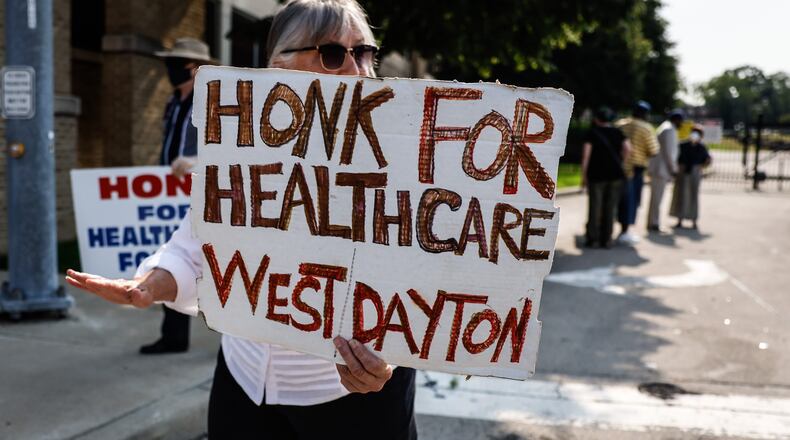“This is new for Dayton, so we just really hope that we can get the support of the citizens of Dayton for this initiative,” said Nancy Kiehl, secretary of the Clergy Community Coalition.
The coalition needs 1,250 signatures to bring the initiative before the Dayton City Commission. The tax on a house that is appraised at $100,000 is $35 in tax per mill.
“Even though we’re asking all the voters of Dayton to support a public hospital on the west side of Dayton, we just hope that there’s understanding out there that that West Dayton is a health care desert,” Kiehl said.
There are health care options like Five Rivers Family Health Centers and the Northwest Health and Wellness Campus, which includes an urgent care and specialty care doctors, at the new Premier Health YMCA.
There is no 24-hour emergency service in West Dayton, Kiehl said.
“This is going to be a public hospital, which means they take all insurances, and everybody is welcome,” Kiehl said.
Processes behind the management of the hospital would be open to public oversight, she said.
What’s next in the local citizens initiative process?
The coalition is aiming to get this initiative on the November ballot this fall. If it passes, the taxes would start to be collected in 2025, and then the first payment toward the start of the hospital would be in 2026, Kiehl said.
“We really have had widespread support (from) everybody that we’ve been able to get the word out to about it,” Kiehl said.
The coalition plans to hand in the signatures by July 18, she said.
The petition will go to the Dayton City Commission clerk, and the clerk will have to verify the signatures, according to the city of Dayton Law Department.
At the next scheduled city commission meeting after the petition is turned in and the signatures are verified, the city commission will have to schedule a public hearing within 14 days. The commission will then have to vote on placing the initiative on the ballot.
If a majority of the city commission does not approve placing the initiative petition on the ballot, the petitioners have the opportunity to collect another 1,250 new signatures to bring it before the city commission again.
The deadline to get items like this initiative placed on the November ballot is 90 days before the election, which would be July 31.
A local citizen’s initiative is also rare and hasn’t been seen in Dayton in recent years.
“I don’t know that I’ve seen one in my nine years in this seat,” said Barbara Doseck, director of Dayton’s law department.
Good Sam closure still looms over West Dayton
This move follows years of protests and a failed civil rights complaint over the 2018 closure of Good Samaritan Hospital, which was owned by Premier Health.
The complaint was filed with the Office for Civil Rights in 2018 by Advocates for Basic Legal Equality on behalf of the Clergy Community Coalition against Premier Health Partners.
The closing of the 2222 Philadelphia Drive hospital would “have a discriminatory and separate adverse impact on African Americans and women” in violation of the Civil Rights Act and under the Affordable Care Act, the complaint said.
A federal investigation did not find sufficient evidence to prove civil rights violations by Premier Health in the 2018 closure of Good Samaritan Hospital, according to the U.S. Department of Health and Human Services in March 2022.
Even with that outcome, the coalition followed up with some of the people interviewed in that investigation, saying the closure of the hospital had still disrupted some of their lives.
“We’ve gone back and talked to some of the people that were interviewed from that federal investigation, and many of them have had to move,” Kiehl said.
People who are chronically ill often move close to a hospital in order to have easier access to it, Kiehl said.
“Travel time has been hard for a lot of people,” Kiehl said. “It’s multiple buses down to Miami Valley, or it’s asking neighbors to take them to appointments, and then the other thing is some people just decide not to get care.”
“Premier Health is committed to caring for Northwest Dayton and neighboring communities,” Premier Health said in an organizational statement.
The health care services that opened in January at the Northwest Health and Wellness Campus reflect that commitment, the health system said.
“That brand-new facility also reflects the input of hundreds of local residents through community meetings and surveys – all part of a collaborative, inclusive process,” Premier Health said.
Premier Health will continue to work with other community partners like Five Rivers to monitor local health care needs and adjust services as necessary, its statement said.
“Premier Health also is committed to addressing barriers to care that patients might face, including transportation needs,” it said.
When appropriate, Premier Health provide rides for qualifying patients via local cab, Uber and Lyft services at no additional cost to the patient, according to the health system.
“Generous donors help meet this gap via the Premier Health foundations. Transportation support also is provided for outpatient care, as we identify community resources to help patients get to and from appointments,” Premier Health said.
About the Author

